- Clone
- D7715A7 (See other available formats)
- Regulatory Status
- RUO
- Other Names
- IL-6 Receptor α chain, IL-6R
- Isotype
- Rat IgG2b, κ
- Ave. Rating
- Submit a Review
- Product Citations
- publications
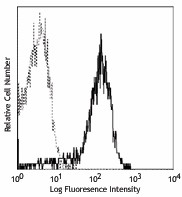
-

F0 mouse myeloma cell line stained with D7715A7 PE
| Cat # | Size | Price | Quantity Check Availability | Save | ||
|---|---|---|---|---|---|---|
| 115803 | 50 µg | 72€ | ||||
CD126 is an 80 kD IL-6 receptor α chain also known as IL-6R. It is a member of the immunoglobulin superfamily that is expressed on activated T and B cells, monocytes, hepatocytes, and plasma cells. High affinity IL-6 receptors are formed by the non-covalent association of CD126 and the IL-6 receptor β chain (CD130 or gp130). CD126 binds IL-6 with low affinity, but does not signal. The β chain (gp130, CD130) does not bind IL-6 by itself, but associates with the α-chain/IL-6 complex to initiate signal transduction. IL-6 binding to the receptor complex results in the stimulation of B and T cells, and hematopoietic precursor proliferation and differentiation. The D7715A7 (15A7) antibody blocks IL-6/IL-6 receptor interactions.
Product DetailsProduct Details
- Verified Reactivity
- Mouse
- Antibody Type
- Monoclonal
- Host Species
- Rat
- Immunogen
- OKT4 hybridoma cells
- Formulation
- Phosphate-buffered solution, pH 7.2, containing 0.09% sodium azide.
- Preparation
- The antibody was purified by affinity chromatography, and conjugated with biotin under optimal conditions.
- Concentration
- 0.5 mg/ml
- Storage & Handling
- The antibody solution should be stored undiluted between 2°C and 8°C. Do not freeze.
- Application
-
FC - Quality tested
- Recommended Usage
-
Each lot of this antibody is quality control tested by immunofluorescent staining with flow cytometric analysis. For flow cytometric staining, the suggested use of this reagent is ≤1.0 µg per million cells in 100 µl volume. It is recommended that the reagent be titrated for optimal performance for each application.
- Application Notes
-
Additional reported applications (for the relevant formats) include: immunoprecipitation1,2,5, in vivo receptor blocking1-2,4-6,8, and in vitro neutralization7. For most successful immunofluorescent staining results, it may be important to maximize signal over background by using a relatively bright fluorochrome-antibody conjugate (Cat. No. 115806) or by using a high sensitivity, three-layer staining technique (e.g., including a biotinylated antibody (Cat. No. 115804) or biotinylated anti-rat IgG second step (Cat. No. 405402), followed by SAv-PE (Cat. No. 405204)). The LEAF™ purified antibody (Endotoxin <0.1 EU/µg, Azide-Free, 0.2 µm filtered) is recommended for functional assays (Cat. No. 115808).
Please note, this clone had previously reported reactivity to rat, however upon further testing it has been determined to not react with rat. - Application References
-
- Coulie PG, et al. 1990. Curr. Top. Microbiol. Immunol. 166:43. (Block, IP)
- Vink A, et al. 1990. J. Exp. Med. 172:997. (Block, IP)
- Sun R, et al. 2004. J. Immunol. 172:5648. (FC)
- McKinney WJ, et al. 1998. Am. J. Respir. Cell Mol. Biol. 18:696. (Block)
- Weigert C, et al. 2006. J. Biol. Chem. 281:7060. (Block, IP)
- Koizumi N, et al. 2007. J. Immunol. 178:1767. (Block)
- Walker F, et al. 2008. Blood 111:3978. (Neut) PubMed
- Yadav M, et al. 2008. J. Immunol. 180:2772. (Block) PubMed
- Sintes J, et al. 2010. J. Leukoc. Biol. 88:687. PubMed
- Product Citations
-
- RRID
-
AB_313674 (BioLegend Cat. No. 115803)
Antigen Details
- Structure
- Ig superfamily, associates with IL-6Rβ chain (CD130, gp130), 80 kD
- Distribution
-
Activated T cells and B cells, monocytes, hepatocytes, plasma cells
- Function
- Stimulates T cells, B cells, hematopoietic precursor proliferation and differentiation
- Ligand/Receptor
- IL-6
- Cell Type
- B cells, Mesenchymal Stem Cells, Monocytes, Plasma cells, T cells, Tregs
- Biology Area
- Cell Biology, Immunology, Innate Immunity, Neuroinflammation, Neuroscience, Signal Transduction
- Molecular Family
- CD Molecules, Cytokine/Chemokine Receptors
- Antigen References
-
1. Taga T, et al. 1997. Annu. Rev. Immunol. 15:797.
2. Fitzgerald K, et al. 2001. The Cytokine FactsBook. Academic Press London.
3. Boulanger MJ, et al. 2003. Science 300:2101. - Gene ID
- 16194 View all products for this Gene ID
- UniProt
- View information about CD126 on UniProt.org
Related FAQs
- How many biotin molecules are per antibody structure?
- We don't routinely measure the number of biotins with our antibody products but the number of biotin molecules range from 3-6 molecules per antibody.
Other Formats
View All CD126 Reagents Request Custom Conjugation| Description | Clone | Applications |
|---|---|---|
| Biotin anti-mouse CD126 (IL-6Rα chain) | D7715A7 | FC |
| PE anti-mouse CD126 (IL-6Rα chain) | D7715A7 | FC |
| APC anti-mouse CD126 (IL-6Rα chain) | D7715A7 | FC |
| PE/Cyanine7 anti-mouse CD126 (IL-6Rα chain) | D7715A7 | FC |
| Ultra-LEAF™ Purified anti-mouse CD126 (IL-6Rα chain) | D7715A7 | FC,Block,IP,Neut |
Compare Data Across All Formats
This data display is provided for general comparisons between formats.
Your actual data may vary due to variations in samples, target cells, instruments and their settings, staining conditions, and other factors.
If you need assistance with selecting the best format contact our expert technical support team.
-
Biotin anti-mouse CD126 (IL-6Rα chain)
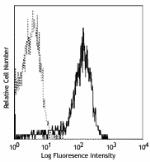
F0 mouse myeloma cell line stained with D7715A7 PE -
PE anti-mouse CD126 (IL-6Rα chain)

F0 mouse myeloma cell line stained with D7715A7 PE -
APC anti-mouse CD126 (IL-6Rα chain)
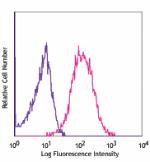
Mouse myeloma FO cells stained with D7715A7 APC -
PE/Cyanine7 anti-mouse CD126 (IL-6Rα chain)
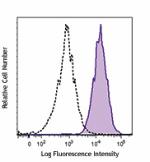
Mouse myeloma cell line FO was stained with CD126 (clone D77... -
Ultra-LEAF™ Purified anti-mouse CD126 (IL-6Rα chain)
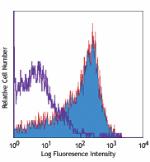
C57BL/6 mouse splenocytes stained with LEAF™ purified D7715A...
 Login / Register
Login / Register 










Follow Us